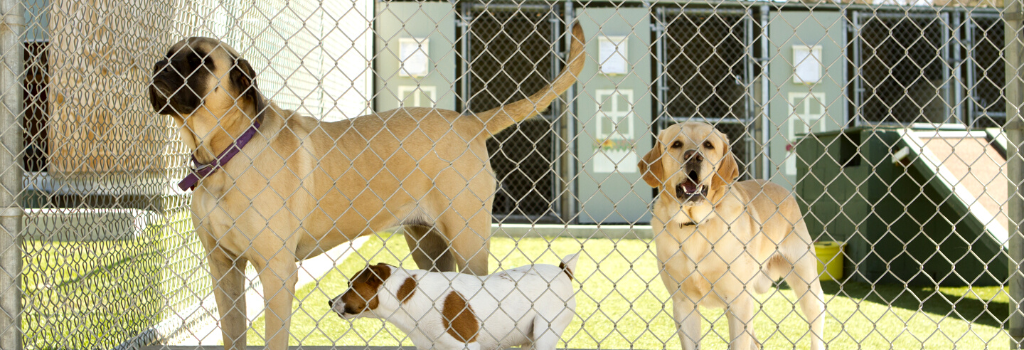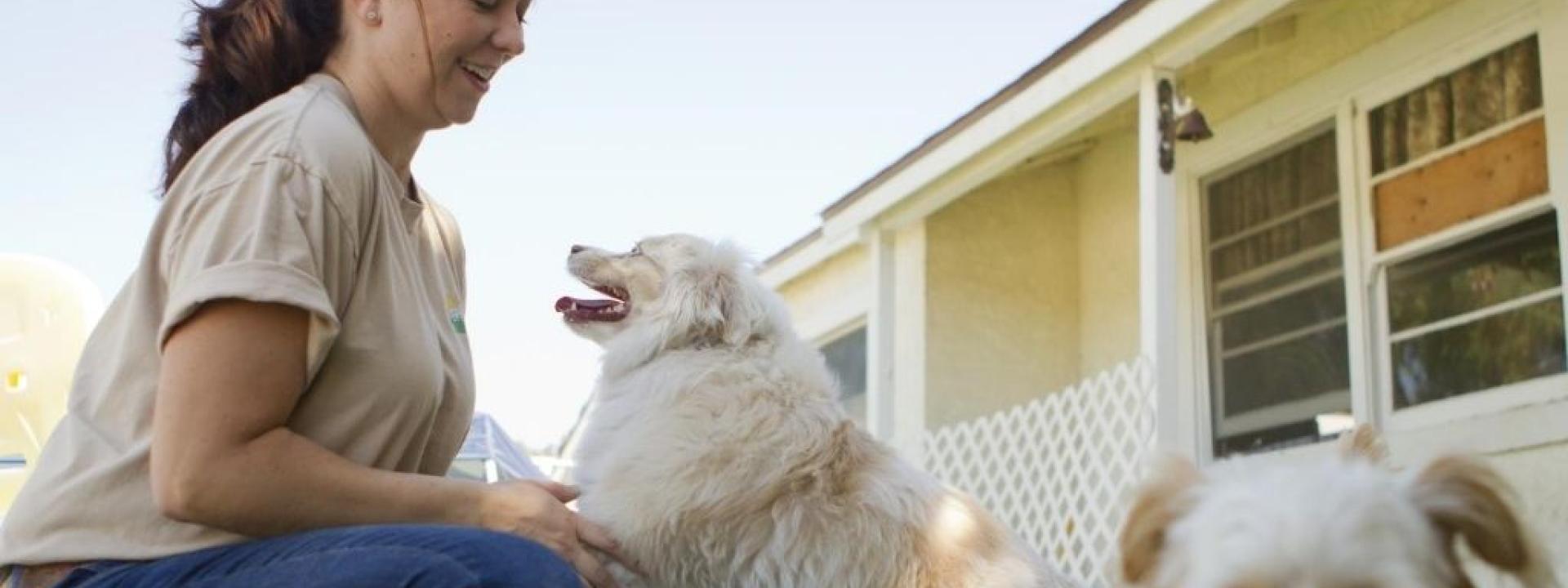Many of us (admittedly) compulsive dog owners would like to bring our dogs everywhere, but the harsh truth is that's not reality. There comes a time when you will need to travel or otherwise take time away from your dog, and boarding your canine companion will likely become an option. Congratulations on doing your due diligence by turning to the web for answers. We're glad you found us, as you can often stumble across misinformation from Dr. Google! At Veterinary Medical Center, we work extremely hard to bring you the accurate information you need to ensure your pup is safe while you're away and that you have peace of mind. That's why we've taken FAQs on dog boarding and answered them as thoroughly as possible, so you have the trusted information you need to ensure all goes off without a hitch.
If you're looking for a highly trained veterinarian in Union City, CA, we'd love to see your dog, ensure they're healthy and prepared for boarding, and answer any questions you have, so please don't hesitate to call us at (510) 441-8500.
What should I consider when boarding my dog?
The most important thing to consider when boarding your dog is what you need from the experience. Some of our dogs may need assistance with chronic health issues or something like that. Other dogs may be young and full of energy, making socialization more important. Our dogs often form a very close bond with us, so we know that it can be stressful when you need to leave town or board your animal for whatever reason. Looking at your specific dog's needs is the best thing to help you make the wisest decision for your pet in the type of boarding.
What are the different types of dog boarding options?
There are many different types of dog boarding options. The first one would simply be a pet sitter coming to your home to either stay in your home and take care of your pet or check on your pet. Other options would be boarding at a boarding facility where they may have situations where your dog can interact or play with other dogs. Dogs that are more prone to the stress of not being with you if you're out of town may be best served in an environment where they're getting extra special attention from individuals—at a boarding facility or veterinary hospital. In these instances, they're getting love and cuddles from people, and they still have that human-animal bond.
There are veterinary hospitals that board as well. There are often medical concerns when someone searches for that option. We know your dog well, and building off that relationship and your pet being in a familiar environment is always good.
It's vital to weigh your dog's specific characteristics or behavior. For example, if you have a more independent dog, you can have a dog sitter come, let your dog out for a walk several times a day, socialize and feed your dog, and your dog would be fine. On the other hand, if you've got a puppy or a mischievous dog that's known to get into things, they're not supposed to - like socks or toys that could cause a dangerous, if not deadly, obstruction - you obviously can't go that route. There are different risks or characteristics in the dog that you need to weigh when making your decision.

Will my dog get active and social time while boarding?
Absolutely, but every dog's social times and activities are different. Not every dog likes friends—some of them like humans but not other dogs. Boarding facilities will try to go by the dog's size, the dog's activity level, and whether they like fellow dog friends. If they don't like fur friends, they get the same amount of time as the other dogs do, but they're by themselves and just get snuggles from the humans working there.
What questions should I ask at the dog boarding facility or kennel?
As a responsible dog owner, there are several things you're going to want to ask the facility to make this experience as smooth as possible for you and your faithful canine companion.
Some questions to ask the dog boarding facility or kennel you're considering are:
- How much supervision will there be? If our dogs are in an open environment to play with other pets, they must have supervision during that period to ensure everyone's getting along and playing appropriately. Some places provide overnight supervision and care for your dogs where someone is present. That's not always the case.
- Knowing the vaccine requirements for any boarding facility are also important because they vary. We must prevent the spread of illness or infection by ensuring our vaccinations are current. When our dogs are in close quarters together, it's easy for bad things to spread around. You want to ensure that your dog is current on whatever the boarding facility may require regarding vaccination.
- You also want to learn about the food they'll be getting—whether they provide this or you do.
- You'll want to know what things you need to bring for their boarding stay or even can bring, as some facilities don't like to take on the liability that goes with toys or things that can cause trouble, such as obstructions.
- If your dog is on medication, you want to know how they handle that.
- Find out how much outdoor and socialization time they get, especially if that's important to your dog.
- You'll want to observe and/or directly ask about sanitation—hopefully, most boarding facilities have AstroTurf, so things can remain clean even when other dogs are doing their business outside!
Suppose the boarding facility is not at a veterinary clinic. In that case, you should probably find out whether there is 24-hour supervision and whether they have a clinic on-call close by their location. And if you're hoping for a bit of a spa experience for your pet, feel free to ask if they offer baths and other grooming services!
What do boarding facilities need to know about my dog?
First and foremost, boarding facilities need to know if your dog has a medical condition, especially diabetes. Most facilities like to keep diabetic dogs in a separate locations to pay close attention to them.
Some other things boarding facilities will need to know about your dog are:
- They'll want to know if the dog is on medications and the dosages and other pertinent information (the same goes for vitamins and supplements).
- Let them know if they like to be around other pets.
- If they've never been around pets, it's critical to let them know.
- Are they trained? Some places will offer this as part of their services.
- Ensure the place knows if your dog is sensitive to certain foods or treats.
Let's face it—if your dog is the type for shenanigans, they will want to know that. You may want to withhold that kind of information, thinking it's shameful, but these boarding facility employees would rather know what they're up against than be caught unprepared. They can plan for extra supervision and playtime.

What do veterinarians generally recommend for safe pet boarding?
Of course, every veterinarian would prefer that a veterinarian is on hand. If not, we want to know that the facility has one at least close by and on-call in case of emergency. If your animal needs 24-hour supervision, you want to go to a place with that. But most of the time, dogs in that situation will require hospitalization or 24-hour care in a 24-hour facility.
Veterinarians working at boarding facilities want to know if there's anything you're used to seeing that they're not used to seeing. In other words, if your dog breathes funny due to a collapsing trachea that we don't know about and we hear them coughing, or they are breathing differently than what we've seen, we will take extra precautions to ensure they're safe immediately. But of course, if that's normal for your dog and they've already been under the care of a veterinarian, let the boarding facility employees know ahead of time so it doesn't cause a panic.
What should I bring, and how should I prepare when boarding my pet?
Food is the most important discussion in this regard, as sudden changes to a dog's diet can cause stomach upset or allergies. And if they're already going to be slightly stressed, at least upon initially getting to the facility, the last thing you want is to irritate that even more. So keep them on the dog food they're used to eating. One thing you can do that makes things easy is pre-packaging your dog's food. Get some little Ziplock baggies. If your dog eats a half cup of their food in the morning and evening, then go ahead and pre-package those. That way, you can ensure they're getting fed appropriately and eating all their food.
If your dog is on a special or prescription diet, bring that food with you. Or if your dog eats a brand of food that the facility doesn't carry, make sure it's okay that you bring that for them to serve your dog. Most facilities are perfectly fine with feeding your diet from home at no extra charge. If they're on any supplements or anything like that, the boarding agreement form will have all that information on there for you to review with the boarding facility employees. But we would like to know those things, and there may be a small additional charge for something like that.
Of course, bring any medications at all that your dog needs. And most facilities will certainly welcome you to bring toys, beds, and anything else from home you would like. If your dog is the type to eat things they're not supposed to, it's best to leave those kinds of things at home to avoid any type of emergency—particularly if your dog gets separation anxiety.
The American Kennel Club (AKC) has an excellent checklist you can refer to when considering dog boarding facilities. If you have further questions about boarding your dog in a way that reduces stress for both you and your loyal companion, reach out to your veterinarian. If you live in or near Union City, CA, we'd love to see your dog, so please don't hesitate to call us at (510) 441-8500 or email us at [email protected].

